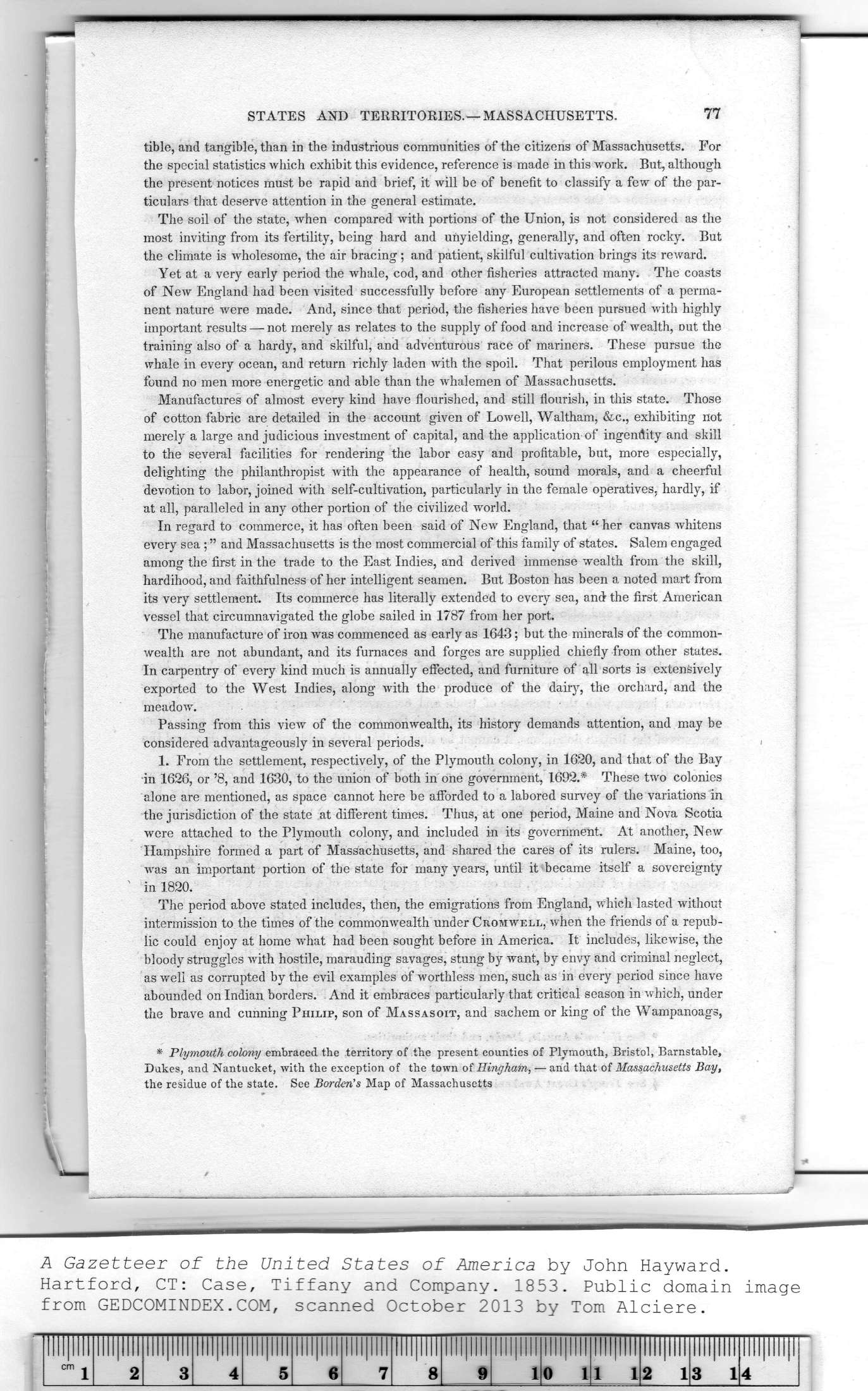|
|
Note: Ctrl and + increases the font size of the text below, Ctrl and - decreases it, and Ctrl and 0 resets it to default size.
STATES AND TERRITORIES. —MASSACHUSETTS. 77
tible, and tangible, than in the industrious communities of the citizens of Massachusetts. For
the special statistics which exhibit this evidence, reference is made in this work. But, although
the present notices must be rapid and brief, it will be of benefit to classify a few of the par-
ticulars that deserve attention in the general estimate.
The soil of the state, when compared with portions of the Union, is not considered as the
most inviting from its fertility, being hard and unyielding, generally, and often rocky. But
the climate is wholesome, the air bracing; and patient, skilful cultivation brings its reward.
Yet at a very early period the whale, cod, and other fisheries attracted many. The coasts
of New England had been visited successfully before any European settlements of a perma-
nent nature were made. And, since that period, the fisheries have been pursued with highly
important results — not merely as relates to the supply of food and increase of wealth, Dut the
training also of a hardy, and skilful, and adventurous race of mariners. These pursue the
whale in every ocean, and return richly laden with the spoil. That perilous employment has
found no men more energetic and able than the whalemen of Massachusetts.
Manufactures of almost every kind have flourished, and still flourish, in this state. Those
of cotton fabric are detailed in the account given of Lowell, Waltham, &c., exhibiting not
merely a large and judicious investment of capital, and the application of ingcndity and skill
to the several facilities for rendering the labor easy and profitable, but, more especially,
delighting the philanthropist with the appearance of health, sound morals, and a cheerful
devotion to labor, joined with self-cultivation, particularly in the female operatives, hardly, if
at all, paralleled in any other portion of the civilized world.
In regard to commerce, it has often been said of New England, that “ her canvas whitens
every sea ; " and Massachusetts is the most commercial of this family of states. Salem engaged
among the first in the trade to the East Indies, and derived immense wealth from the skill,
hardihood, and faithfulness of her intelligent seamen. But Boston has been a noted mart from
its very settlement. Its commerce has literally extended to every sea, andr the first American
vessel that circumnavigated the globe sailed in 1787 from her port.
The manufacture of iron was commenced as early as 1643; but the minerals of the common-
wealth are not abundant, and its furnaces and forges are supplied chiefly from other states.
In carpentry of every kind much is annually effected, and furniture of all sorts is extensively
exported to the West Indies, along with the produce of the dairy, the orchard, and the
meadow.
Passing from this view of the commonwealth, its history demands attention, and may be
considered advantageously in several periods.
1. From the settlement, respectively, of the Plymouth colony, in 1620, and that of the Bay
in 1626, or '8, and 1630, to the union of both in one government, 1692.1 These two colonies
alone are mentioned, as space cannot here be afforded to a labored survey of the variations in
the jurisdiction of the state at different times. Thus, at one period, Maine and Nova Scotia
were attached to the Plymouth colony, and included in its government. At another, New
Hampshire formed a part of Massachusetts, and shared the cares of its rulers. Maine, too,
was an important portion of the state for many years, until it became itself a sovereignty
in 1820.
The period above stated includes, then, the emigrations from England, which lasted without
intermission to the times of the commonwealth under Cromwell,when the friends of a repub-
lic could enjoy at home what had been sought before in America. It includes, likewise, the
bloody struggles with hostile, marauding savages, stung by want, by envy and criminal neglect,
as well as corrupted by the evil examples of worthless men, such as in every period since have
abounded on Indian borders. And it embraces particularly that critical season in which, under
the brave and cunning Philip, son of Massasoit, and sachem or king of the Wampanoags,
A Gazetteer of the United States of America by John Hayward.
Hartford, CT: Case, Tiffany and Company. 1853. Public domain image
1
Plymouth colony embraced the territory of the present counties of Plymouth, Bristol, Barnstable,
Dukes, and Nantucket, with the exception of the town of Ilingham, — and that of Massachusetts Bay,
the residue of the state. See Borden's Map of Massachusetts
|
